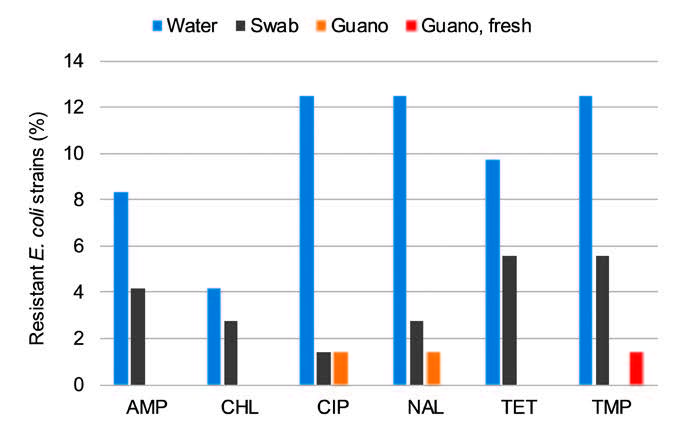Antimicrobial resistant Escherichia coli from karst waters, surfaces and bat guano in Slovenian caves
DOI:
https://doi.org/10.3986/ac.v49i2-3.9103Keywords:
caves, water, bats, guano, swabs, E. coli, antimicrobial resistanceAbstract
Escherichia coli, one of the primary intestinal commensal bacteria in humans and endothermic animals, is commonly considered an indicator of faecal pollution. E. coli strains were isolated from karst rivers under different hydrological conditions, from footpaths in tourist caves and from bat guano. Isolates were tested for phenotypic resistance to ampicillin, chloramphenicol, ciprofloxacin, nalidixic acid, tetracycline and trimethoprim. The highest percentage of antimicrobial resistant E. coli was found in karst waters, followed by those from surface swabs and from bat guano. Several isolates from rivers and swabs exhibited multidrug-resistant phenotype. Environmental conditions impact the populations of E. coli; a positive correlation between dissolved oxygen and E. coli counts, and a negative correlation between conductivity and E. coli concentrations have been observed for karst rivers. Malenščica (Slovenia), a drinking water resource with an extensive catchment area, contained a relative high percentage of antimicrobial-resistant E. coli strains. None of the isolates from bat guano was resistant to ampicillin, chloramphenicol, and tetracycline. Future monitoring of bats should consider a regular follow-up of indicative microbial disease indicators in fresh guano. Regular cleansing of tourist footpaths in caves and disinfection barriers at the cave entrances reduce the concentration and transmission of E. coli significantly. A future, more detailed, study on characterization of additional E. coli isolates is needed to reveal their pathogeneicity, mechanisms of antibiotic resistance, mobile genetic elements, and gene transfer frequencies to other members of the karst microbiome.
Downloads

Downloads
Published
How to Cite
Issue
Section
License

This work is licensed under a Creative Commons Attribution-NonCommercial-NoDerivatives 4.0 International License.
Authors guarantee that the work is their own original creation and does not infringe any statutory or common-law copyright or any proprietary right of any third party. In case of claims by third parties, authors commit their self to defend the interests of the publisher, and shall cover any potential costs.
More in: Submission chapter




